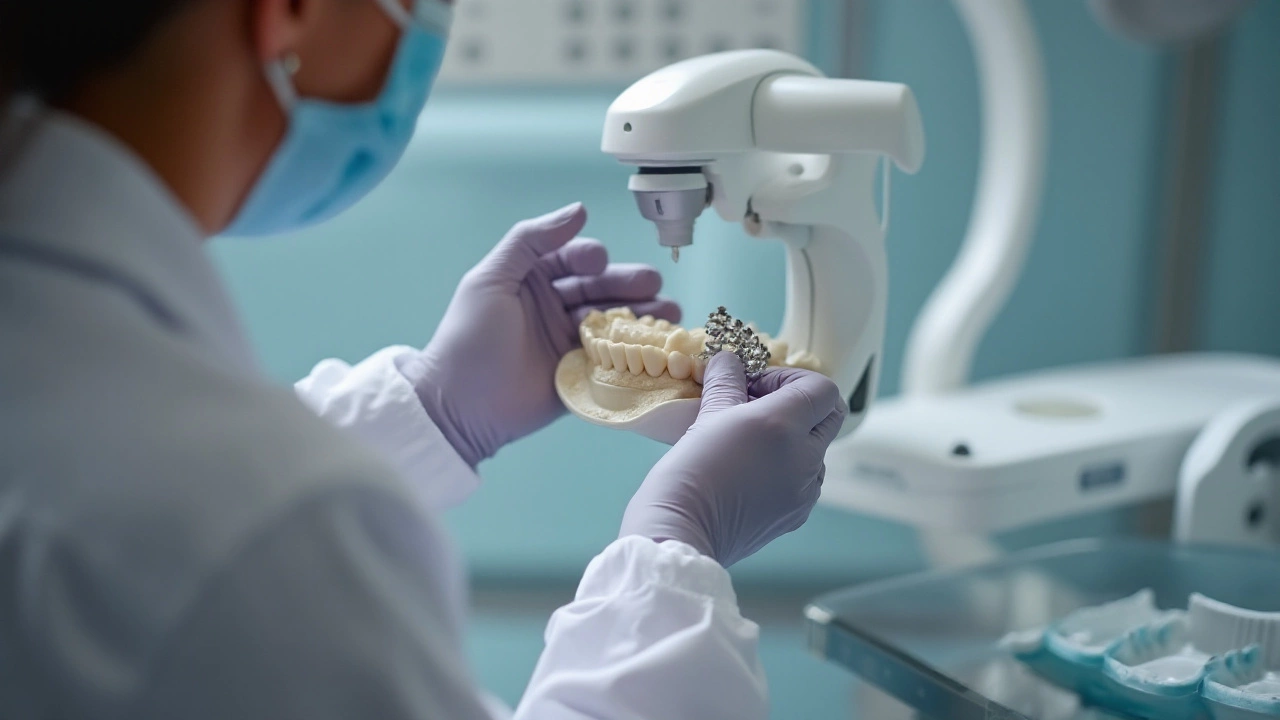As we journey through life, the signs of wear and tear often become most apparent in our smiles. For those entering their 50s, the question often arises: is dental implant surgery still a viable option? This query is not only medical but deeply personal, affecting one's quality of life and self-esteem.
Navigating the world of dental care can be daunting, but understanding the basics of dental implants can demystify the process. At heart, dental implants are about restoring not just the function of your teeth, but the confidence in your smile too. Engaging with this dental solution in your 50s can be a transformational experience.
Age brings wisdom, but it also brings changes in health, which can influence dental decisions. However, the 50s are a time when many are still in good health and can effectively manage the implant process. Delving into the specifics of how age impacts this decision can dispel myths and shed light on the possibilities.
- Understanding Dental Implants
- Age Considerations for Implants
- Health and Lifestyle Benefits
- Making the Right Decision
Understanding Dental Implants
When stepping into the realm of dental implants, it is essential to first understand what these remarkable devices entail. Simply put, a dental implant is a small titanium post surgically placed into the jawbone beneath the gum line. This post acts as a replacement for the root of a missing tooth and serves as a solid foundation for mounting replacement teeth. The beauty of this modern dental technology lies in its ability to provide a stable and permanent solution for individuals missing one or more teeth.
The process of getting dental implants typically begins with a thorough consultation with an experienced dental professional. They will evaluate your oral health, take detailed X-rays, and possibly create 3D images to craft a personalized treatment plan. This initial step is crucial in determining the appropriate type and placement of the implant and ensuring the surrounding bone is healthy and strong enough to support the new addition. Did you know that implants boast an impressive success rate of over 95%? This statistic underscores their reliability and the mastery required by dental surgeons.
The structure of a dental implant can be broken down into three parts: the implant itself, the abutment, and the crown. The implant acts as a root, integrating with the jawbone through a process known as osseointegration. This biological bonding ensures that the implant remains fixed in place, providing the same strength and stability as natural teeth. Next, the abutment is attached, serving as a connector between the implant and the prosthetic crown. Once this is securely in place, a custom-made crown is fitted atop, tailored to match the color, shape, and size of your natural teeth, thus seamlessly blending into your smile.
"Dental implants are literally a new lease on life for many, allowing you to eat, speak, and smile confidently," explains Dr. Sarah Patel, a renowned dental implant specialist based in London. Her insights emphasize the transformative effect of this procedure on patients' lifestyles and self-esteem.
It is also essential to note that dental implants are not restricted to single-tooth replacements. For those missing multiple teeth, implants can support bridges, eliminating the need for adjacent teeth to be altered or compromised. Additionally, for individuals who have lost all their teeth, implant-supported dentures offer a secure and comfortable alternative to traditional dentures. This innovative multi-functional use reinforces why implants have become the gold standard in tooth replacement. The heavy emphasis on tailored treatment also highlights the personalized nature of dental care, ensuring optimal outcomes tailored precisely to each individual's needs.
Beyond aesthetics and functionality, dental implants contribute significantly to overall oral health. By preventing bone loss, they help maintain the natural shape of the face, a crucial factor as we age. Unlike dentures, implants eliminate the inconvenience of removing them regularly for cleaning and the necessity of using adhesives. Long-term, they save the adjacent teeth from grinding down or shifting, thus preserving the integrity of your entire mouth. These factors contribute to why many consider them worth the investment, despite initial costs and time commitments.

Age Considerations for Implants
In the realm of dental care, age often becomes a pivotal factor when contemplating the viability of various treatments, including dental implants. Reaching the age of 50 heralds a new chapter in life, where people often reassess their health priorities and focus on sustaining quality of life. The question arises for many: Does age serve as a barrier to such dental advancements? Generally speaking, it doesn't. Individuals in their 50s, who are often in robust health, can be ideal candidates for implants because they typically manage health conditions well, if present, and maintain an active lifestyle that supports healing. This decade also marks a period when many carpool their caregiving duties and career advancements, bringing about a focus on personal well-being and appearance. In truth, dental professionals often note that chronological age is less of a concern compared to the biological age – factors like bone health and oral hygiene play a more crucial role in determining eligibility for dental implants.
There's a silver lining as one enters their 50s; often, there is greater access to resources and understanding of one's health conditions. This age brings a sense of maturity and an established routine of professional dental check-ups. Regular visits to the dentist can catch issues like bone density reduction early, which is crucial since dental implants require adequate jawbone support. Moreover, individuals who maintain a regimen of strong oral hygiene significantly enhance their eligibility for implants since good gum health ensures a better prognosis post-surgery. There are instances where aged individuals have undergone bone grafts to prepare for implants successfully, a testament to the adaptability of modern dental procedures. In fact, statistics indicate that implant success rates for middle-aged adults are at par with younger cohorts, owing to advancements in dental technologies and personalized care plans.
A vital consideration at 50 is how health conditions, prevalent at this age, intersect with dental procedures. Common issues like diabetes or autoimmune diseases can influence healing times; however, they are not absolute deterrents. With meticulous management and consultation with healthcare providers, these conditions can be addressed alongside tooth replacement. An interesting insight comes from the oral health research community, where studies have highlighted that maintaining an active lifestyle coupled with a balanced diet may offset some of the health risks typically associated with aging, further bolstering the case for successful implant procedures. Dr. John Matthews, a renowned oral surgeon, remarked,
"At 50 and beyond, patients often prioritize enhancing life's quality, and dental implants can play a pivotal role in this pursuit, bringing not only function back to the mouth but also instilling a boost in overall confidence."

Health and Lifestyle Benefits
Embracing dental implants at 50 can unlock a multitude of health and lifestyle advantages that extend far beyond mere aesthetics. While many are aware of the visual enhancements, fewer recognize the profound impact implants can have on oral health as a whole. With missing teeth, bone loss in the jaw can occur, which might lead to a cascade of issues including changes in facial structure and additional tooth loss. Dental implants can help to stimulate bone growth and maintain the integrity of the jawbone, fundamentally halting this progressive deterioration. This preservation of bone structure not only contributes to a more youthful appearance but also ensures a stable foundation for neighboring teeth, enhancing their longevity as well.
Beyond the physiological, there is an equally significant improvement in day-to-day life. With implants, individuals often report substantial improvements in their quality of life, experiencing greater comfort and ease in eating. Implants function similarly to natural teeth, allowing individuals to enjoy a varied diet that includes tougher foods that might be shunned with dentures or missing teeth. This expanded dietary freedom can lead to better nutrition and, consequently, improved general health. The psychological benefits are noteworthy too. People frequently feel a sense of renewal and boost in self-confidence when their smiles are restored, enabling fuller social interaction and engagement with others without self-consciousness. As Dr. John Robinson from the British Dental Association explains, "A restored smile can revitalise one's sense of self, leading to a more vibrant engagement with life's everyday moments."
The process of integrating implants can also have positive ripple effects on lifestyle management. For instance, implants don’t require the convenience of removal like dentures do, which means simpler maintenance routines and less potential hygiene dilemmas. Many 50-year-olds, often balancing busy personal, professional, and familial roles, find the enduring nature of implants less cumbersome and more attuned to their aspirations for a hassle-free life. This minimal maintenance engenders a peace of mind many find priceless, especially when weighed against the alternative hassles of other dental replacements. The flexibility and permanence of dental implants resonate well in the lifestyle of active individuals, making it a favorable choice when considering modern dental care solutions in the UK.

Making the Right Decision
Deciding to get dental implants at the age of 50 revolves around a balance between health considerations, personal needs, and expectations for quality of life. When evaluating such a significant investment, it’s important to consider both the practical benefits and the personal impact. For many, implants offer a permanent solution that bridges the gap between traditional dentures and natural teeth. Unlike alternatives, implants integrate with the jawbone, which prevents bone loss and maintains facial structure over time. This unique feature often sways individuals who are still active and wish to maintain an appearance closely aligned with their youthful self. It's essential to know that this decision is not only about aesthetics but deeply tied to maintaining a healthy lifestyle.
One must take into account the various health factors that come into play when considering dental implants. General health conditions such as diabetes or osteoporosis can influence the success rate of the implantation process. Consulting with a knowledgeable oral surgeon can help in assessing if these health challenges might interfere with the desired outcome. However, with modern advances and tailored solutions, most obstacles can be navigated effectively. The dental technology innovations over recent years mean that, for many people in their 50s, implants are both a feasible and reliable choice, providing functionality that enhances life quality. It’s often noted by experts that maintaining oral health during this decade of life sets a foundation for the decades to follow.
Financial aspects also play a crucial role. While it’s true that tooth replacement can represent a significant cost, weighing these costs against the benefits often illustrates a worth-while investment. The one-time expense of implants versus continual adjustments or replacements of other dental services appeals to many who prefer a long-term solution. Breaking down the potential years of use against the cost reveals that, over time, implants might prove to be more economical. Such financial planning can alleviate concerns and pave the way for a decision rooted in assurance and future-oriented health care. A common sentiment in consultations highlights how the life-enhancing benefits of a confident smile are intangible yet invaluable.
Personal Testimonials and Expert Opinions
Many individuals who have chosen the path of dental implants in their 50s speak of renewed vigor and confidence in social interactions. Descriptions from individuals highlight that their new dental state allows them to participate in activities previously shunned due to embarrassment or discomfort. As one satisfied patient shared, “choosing dental implants was not just about improving my smile, but also about gaining back my life.” This perspective is echoed in many personal stories and narrative accounts collected in dental surveys. On professional grounds, Dr. Emily Carter, a seasoned dental surgeon with two decades of experience, notes,
"The impact of dental health on overall health and self-esteem is profound. For those in their 50s, implants can significantly rejuvenate one’s outlook on life."Such sentiments underscore the broad and enriching influence that implants can impart on daily life.
